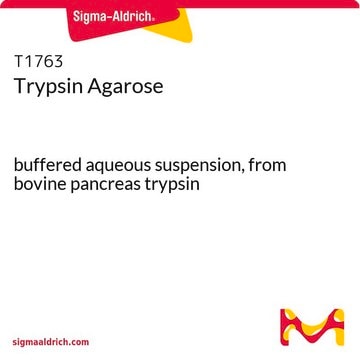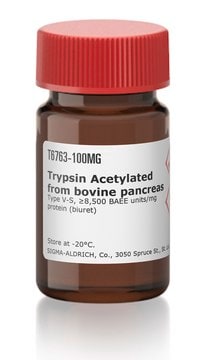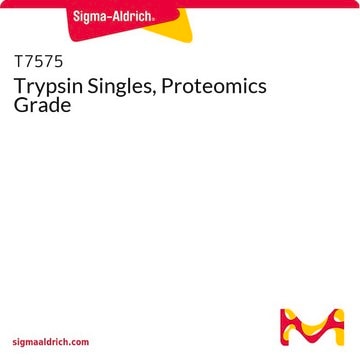T4019
Trypsin−Agarose
buffered aqueous suspension, from bovine pancreas trypsin
Sign Into View Organizational & Contract Pricing
All Photos(1)
About This Item
Recommended Products
biological source
bovine pancreas (trypsin)
form
buffered aqueous suspension
concentration
≥15 units/mL (packed gel)
extent of labeling
≥15 units per mL (packed gel)
matrix
beaded agarose
storage temp.
2-8°C
Related Categories
General description
The trypsin molecule has two domains: one is related to the enzyme active site and the tryptophan residues; the other is related to the 8-anilinonaphthalene-1-sulfonate binding.
Application
An experimental approach using SDS-PAGE, in-gel trypsin digestion and proteomic analysis identified five endosomal proteins. Trypsin cleavage of the high-risk HPV-16 E5 protein (16E5) generates a unique four-amino acid C-terminal peptide that serves as a marker for E5 expression in transfected cells and epithelial cell lines containing integrated and episomal HPV-16 DNA.
Unit Definition
One unit will hydrolyze 1.0 μmole of BAEE per min at pH 8.0 at 30 °C (titrimetric assay).
Physical form
Suspension in approx. 10 mM acetic acid, pH 3.2, containing preservative
Preparation Note
TPCK-treated
Signal Word
Warning
Hazard Statements
Precautionary Statements
Hazard Classifications
Skin Sens. 1
Storage Class Code
10 - Combustible liquids
WGK
WGK 3
Flash Point(F)
Not applicable
Flash Point(C)
Not applicable
Certificates of Analysis (COA)
Search for Certificates of Analysis (COA) by entering the products Lot/Batch Number. Lot and Batch Numbers can be found on a product’s label following the words ‘Lot’ or ‘Batch’.
Already Own This Product?
Find documentation for the products that you have recently purchased in the Document Library.
Customers Also Viewed
Ziad Sahab et al.
Journal of virology, 86(17), 9465-9473 (2012-06-29)
The high-risk human papillomavirus type 16 (HPV-16) E5 protein (16E5) induces tumors in a transgenic mouse model and may contribute to early stages of cervical carcinogenesis. Although high-risk E5 expression is generally thought to be lost during the progression to
Lucilene Delazari dos Santos et al.
Proteomics, 12(17), 2682-2693 (2012-07-05)
It is well known that the activation of mast cells due to the binding of mastoparan to the G(α) subunit of trimeric G proteins involves exocytosis regulation. However, experimental evidence in the literature indicates that mastoparan can also activate certain
Anna Kutschenko et al.
Clinical neurophysiology : official journal of the International Federation of Clinical Neurophysiology, 130(6), 1066-1073 (2019-03-16)
Botulinum neurotoxin serotypes A and B (BoNT/A & B) are highly effective medicines to treat hyperactive cholinergic neurons. Due to neutralizing antibody formation, some patients may become non-responders. In these cases, the serotypes BoNT/C-G might become treatment alternatives. BoNT/D is
Fuying Chen et al.
EMBO molecular medicine, 14(5), e14904-e14904 (2022-04-02)
In this report, we discovered a new entity named cataract, alopecia, oral mucosal disorder, and psoriasis-like (CAOP) syndrome in two unrelated and ethnically diverse patients. Furthermore, patient 1 failed to respond to regular treatment. We found that CAOP syndrome was caused
Kevin J Roberts et al.
Scientific reports, 11(1), 19422-19422 (2021-10-02)
Anti-TNFα and anti-IL-23 antibodies are highly effective therapies for Crohn's disease or ulcerative colitis in a proportion of patients. V56B2 is a novel bispecific domain antibody in which a llama-derived IL-23p19-specific domain antibody, humanised and engineered for intestinal protease resistance
Our team of scientists has experience in all areas of research including Life Science, Material Science, Chemical Synthesis, Chromatography, Analytical and many others.
Contact Technical Service
